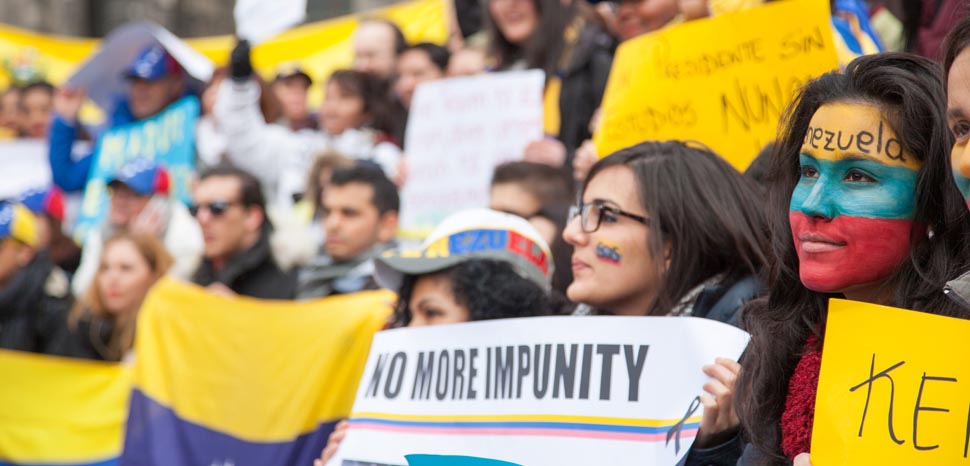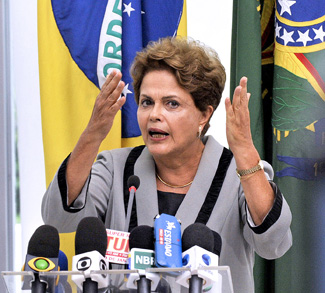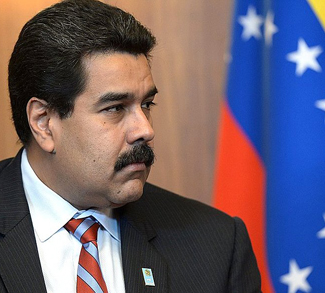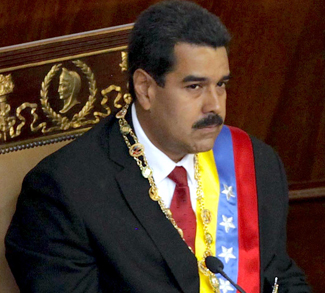Venezuelans faced a battalion of challenges as they prepared to go to the polls on May 20th to elect their next president. Many— inflation, food shortages —have been widely reported on in the media, which has frequently laid the blame at President Nicolas Maduro’s door and the legacy of Chavismo. But it would be intellectually dishonest not to look at the way the U.S. and other global powers have made life harder for the already-suffering Venezuelan people, while getting little in return.
There’s plenty of room to critique Maduro’s politics, but U.S. invectives against his government have escalated to a stunning degree under Donald Trump. The White House surprised policy wonks in August 2017 when President implied he was considering an armed invasion of Venezuela. In remarks shortly before he was sacked, former Secretary of State Rex Tillerson insisted that the United States wasn’t pushing for regime change in Venezuela. His protests, however, were undermined by his repeatedly raising the spectre of a military coup, euphemistically declaring that “when things are so bad the military leadership realizes that it just can’t serve the citizens anymore, they will manage a peaceful transition.”
Other American policymakers have gone still further. U.S. Senator Marco Rubio echoed Venezuelan national hero Simon Bolivar’s words that it is “always noble to conspire against tyranny” and insisted that the “world would support” a military coup removing Maduro from office. The top Trump administration official for Latin American issues, Juan Cruz, gave a fiery speech exhorting the Venezuelan military to privilege loyalty to the country’s constitution rather than to its administration. Many in the audience, including former U.S. Ambassador to Panama John Feeley, interpreted Cruz’s words as a thinly veiled promise of American support for a coup.
Cruz’s call to arms drew mixed reactions. Military hawks in the audience, such as Bush administration official Roger Pardo-Maurer, agreed with Cruz that it was “high time that the Venezuelan military execute a coup and use force to effect government change.” Other attendees were less convinced that it was a wise policy to openly encourage violently overthrowing one’s government, with former Department of Defence official Frank Mora commenting that “the military is not an agent of democratic change.”
Aside from the troubling optics of high-level U.S. officials blatantly advocating regime change by any means necessary, this escalation of rhetoric is unlikely to do anything except add fuel to Maduro’s allegations of American “imperialist aggression” and reinforce nationalist sentiment in Venezuela. Throughout his presidency, Maduro has derived his legitimacy from his opposition to the United States. Maduro’s attempts to portray his country’s myriad problems as part of a concerted attack by the U.S. and its “imperialist hand” would ordinarily seem like a far-fetched conspiracy theory. But the combative stance many American policymakers are taking, however, lends them credibility.
While media frequently portrayed Maduro’s victory as a foregone conclusion, the narrow margin Maduro was elected on in 2013 suggests that his re-election was not necessarily assured. It’s impossible to know how much benefit he drew from a rally around the flag effect in response to the barrage of criticism coming from the United States and its allies. The fact that Maduro’s approval ratings went up by 6 percentage points in the month after Trump threatened military intervention indicates that American criticism may have actually helped Maduro win a second term.
While it’s extraordinarily unlikely that the United States wants to “recolonize” Venezuela, as Maduro has claimed, and a U.S.-sponsored coup or military invasion also seems improbable, the States have already dealt a crushing blow to the South American country by imposing a series of stringent sanctions which have bled its already depleted coffers dry.
The sanctions, which have included cutting Caracas off from the US financial system, have made it virtually impossible for Venezuela to restructure its debt and have weighed heavily on an economy already reeling from low oil prices. Venezuelan government officials such as Foreign Minister Jorge Arreaza have underscored how the sweeping sanctions have hurt the Venezuelan people by exacerbating shortages of food and medicines; it’s a concern that some foreign commentators share.
Despite the fact that the existing sanctions have disappointed some of their proponents and are opposed by the majority of Venezuelans, Trump has threatened to “punish” the country for re-electing Maduro by imposing fresh restrictions, potentially including a complete embargo on Venezuelan oil.
Analysts estimate that such a prohibition would be the “death knell” for Venezuela’s oil industry, which makes up 95% of the country’s exports. While this would certainly hurt Maduro, it would devastate the Venezuelan even more and unleash a global wave of problems which could undermine U.S. policy in any number of ways. Crude oil prices, already at multi-year highs as tensions mounted in the lead-up to the election, would skyrocket.
A desperate Venezuela would be driven further into Russia and China’s embrace, who have already been propping up the Venezuelan economy in exchange for oil on the cheap. The ensuing global scramble for oil would undercut Washington’s Iran policy; difficulty accessing Venezuelan oil would make China and India significantly less likely to support sanctions against Tehran. Saudi oil could help plug some of the shortfall, but Russian oil would also become more in demand, giving Russia leverage over the U.S. even as Russia-U.S. relations languish at an all-time low.
This constellation of ramifications is too serious a price to pay. As a recent Foreign Policy article pointed out, whatever Maduro’s flaws, “Venezuela is no North Korea.” Trump has proven willing, even enthusiastic, to meet with North Korea’s unelected dictator Kim Jong Un and make a deal despite their serious differences. Comparable flexibility with Venezuela would be in the Venezuelan people’s best interest—and in those of the United States.
The opinions, beliefs, and viewpoints expressed by the authors are theirs alone and don’t reflect any official position of Geopoliticalmonitor.com.




